- eISSN 2353-8414
- Phone.: +48 22 846 00 11 ext. 249
- E-mail: minib@ilot.lukasiewicz.gov.pl
Using structural equation modeling to explore the influence of environmental concern on the willingness to pay for green energy and green products – the case of Poland
Szymon Michalak1*, Paweł Bartkowiak2, Magda Stachowiak-Krzyżan3
123Poznań University of Economics and Business, Al. Niepodległości 10, 61-875 Poznań, Poland
1*E-mail: szymon.michalak@ue.poznan.pl
ORCID: 0000-0003-2874-7694
2E-mail: pawel.bartkowiak@ue.poznan.pl
ORCID: 0000-0001-9330-756X
3E-mail: magda.stachowiak-krzyzan@ue.poznan.pl
ORCID: 0000-0002-4093-2238
DOI: 10.2478/minib-2024-0013
Abstract:
Concern for the sustainability of the natural environment is garnering increasing interest across the globe. Environmental issues may significantly impact individuals and societies in various ways, such as by influencing behaviors aimed at adopting more sustainable lifestyles and making eco-friendly purchasing decisions. This study investigates the attitudes of Polish consumers towards pro-environmental behaviors, specifically focusing on environmental concern (EC), promoting pro-environmental behavior (PPB), the belief that Poland should move away from coal (MAFC), and willingness to pay (WTP). Data on these variables were collected in 2023 from a sample of 554 Polish respondents selected using a non-random sampling method. Results were analyzed using confirmatory factor analysis (CFA) and structural equation modelling (SEM). Findings revealed that environmental concern (EC) influences promoting pro-environmental behavior (PPB) and that both EC and PPB affect the belief that Poland should move away from coal (MAFC). Additionally, promoting pro-environmental behavior (PPB) and MAFC were found to influence willingness to pay (WTP). However, EC was not found to have a significant direct impact on WTP. The hypotheses were tested using a structural equation model, validated by such fit indices as CMIN/df = 2.542 (<3.0), RMSEA = 0.053 (<0.08) and CFI = 0.985 (>0.90).
MINIB, 2024, Vol. 52, Issue 2
DOI: 10.2478/minib-2024-0013
P. 1-24
Published September 12, 2024

Using structural equation modeling to explore the influence of environmental concern on the willingness to pay for green energy and green products – the case of Poland
1. Introduction
In the past decade, serious global environmental issues such as climate change, global warming, depletion of natural resources, and air pollution have made customers more aware of their purchasing decisions and their impact on the environment. As environmental problems intensify, it is necessary to alter consumption patterns, lifestyles, and the ways products and services are extracted, distributed, and consumed. Consequently, understanding green purchasing behavior has become increasingly crucial. Numerous studies in recent decades have examined the environmentally friendly behavior of consumers in response to escalating environmental hazards.
Pro-environmental products – also known as environmentally friendly, green or sustainable products – are designed to minimize environmental impacts throughout their entire life-cycle by conserving resources, using renewable energy sources, reducing or eliminating packaging, and minimizing toxicity (Ritter et al. 2015; Durif, Boivin & Julien, 2017). These products benefit both society and the environment, being made from materials that are recyclable, biodegradable or easily reusable (Chen & Chai, 2010).
Green purchasing behavior involves buying pro-environmental products and reducing the purchasing and use of products that harm the environment (Seema et al., 2023; Mohammad et al., 2020; Jaiswal & Kant, 2018). Green consumption is a social phenomenon whereby consumers consider the impact of the products they purchase on present and future generations (Paul et al., 2016; Carman & Cheng, 2016; Mostafa, 2006; Yang et al, 2015). Pro-ecological behavior includes not only consumer practices and motivation to adopt a more sustainable lifestyle, such as separating waste and recycling, conserving resources like water or energy, and changing travel habits (switching from cars to walking or cycling), but can also include specific purchasing decisions, such as buying sustainable products (e.g. local food, organic food, ecological cleaning products, ecological cosmetics, or electric vehicles). Nowadays an increasing number of consumers are interested in pro-environmental products that pose fewer threats to the environment throughout their life-cycle, from production, to use and disposal (Lee & Haley, 2022).
Researchers have focused on a wide range of environmentally friendly products, including food products (Li et al., 2020; Woo & Kim, 2019, De Toni et al., 2018), skin care products (Chin et al., 2018; Hsu et al., 2017), apparel products (Saepudin et al., 2023; Moon & Lee, 2018; Jim Gam, 2011; Lee, 2011), and green electronic appliances (Zhang et al., 2022; Mansoor, Awan & Paracha, 2021).
The main objective of this article is to explore Poles’ attitudes towards pro-environmental behaviors, specifically focusing on environmental concern (EC), promoting pro-environmental behavior (PPB), the belief that Poland should move away from coal (MAFC), and willingness to pay (WTP). Thereby it seeks to advance our knowledge regarding the pro-environmental behavior of Polish consumers.
2. Liturature review
Various contexts of green purchasing behavior have for years been the subject of research around the world. It is extremely important to understand when, how, and why people consume and conserve resources, advocate for environmental causes, and engage in various pro-ecological behaviors. These behaviors have been studied in terms of a variety of factors that influence consumers’ green purchasing decisions. The existing literature has identified a number of individual and social-level variables that affect consumers’ pro-environmental behaviors. However, it remains remarkably difficult to predict responsible consumer behavior, due to the supporting and hindering factors that give rise to individual dilemmas (Dursun et al., 2016). A growing number of researchers agree that there is a clear inconsistency between consumers’ attitudes and their actual sustainable consumption practices; this is known as the attitude–behavior gap (Quoquab et al., 2019; Sudbury-Riley & Kohlbacher, 2016; Carrington et al., 2010; Eckhardt, Belk and Devinney, 2010). The need for additional research to understand pro-environmental behaviors is often discussed.
Environmentally friendly purchasing behavior is a complex and multifaceted issue, influenced by many factors (Sheng et al., 2019). Among the most important factors shaping pro-environmental consumer behavior, researchers have distinguished the following: pro-environmental awareness (Wang, 2013; Liu et al., 2017; Eze, 2020), environmental knowledge (Vasiljevic-Shikaleska et al., 2018; Liu et al., 2014; Mei et al., 2016), environmental concern (Polonsky, 2014; Suki & Suki, 2015), green purchase intention (Polonsky, 2014; Mei et al., 2012; Ramayah et al., 2010), consumer values (Laroche et al., 2001), and consumer attitude (Paul et al., 2016).
Ecological awareness and knowledge in this area have a major impact on pro-ecological behavior. When consumers have a deeper understanding of the environment and pollution problems, they are more likely to adopt environmentally friendly green consumption. Research has demonstrated that consumers who have extensive knowledge of green consumption are more likely to adopt pro-environmental consumption behaviors (Liobikien et al., 2016). In addition, many studies have shown that consumers’ sense of responsibility for the environment has a significant positive influence on their willingness to buy pro-environmental products (Sheng et al., 2019). Environmental responsibility is a sense of commitment that individuals have when they are willing to make efforts to solve ecological and environmental problems, both at the individual and national levels.
Another factor that affects the degree of environmental concern is consumers’ country of origin. Empirically, consumers from developed countries have been shown to be more concerned about the environment than those from developing countries. Nevertheless, further research is needed to understand the particular environmental purchasing behaviors of consumers in each country and how they differ from their counterparts around the world in terms of environmental concerns, beliefs, and attitudes (Singh & Gupta, 2013). This entails a need to conduct research in individual countries, as consumer behavior may vary significantly.
3. Hypothesis Development
The scope of our study includes examining the impact of four contextual variables: environmental concern (EC), promoting pro-environmental behavior (PPB), willingness to pay (WTP), and the belief that Poland should move away from coal (MAFC). In addition, the paper explores the interrelationships between these factors of pro-environmental behavior. We aim to verify not only whether people are concerned about environmental changes, but whether they are also active advocates for changes in consumer behavior and whether they are willing to bear the costs of transformation (regarding products and energy). Specifically, we want to determine if passive concern translates into an intention for action and readiness to make financial sacrifices.
Willingness to pay (WTP)
In this paper, willingness to pay (WTP) is understood as a readiness to share in the costs of transitioning from conventional or less sustainable practices to more environmentally friendly alternatives. The acceptance of environmentally friendly products is strongly influenced by price (Laroche et al., 2001). Consumers who feel an ethical responsibility toward society and the environment demonstrate this through their consumption behavior (Lee et al., 2015). Customers with a strong environmental consciousness and a desire to minimize their impact on the environment are more likely to invest in pro-environmental products, even if it comes at a higher cost.
Consumers who prioritize environmental sustainability are willing to pay more for their beliefs. Environmentally conscious consumers focus on long-term environmental benefits. They are willing to make an upfront investment for a more sustainable future. Findings from Arpad’s (2018) study indicate that in five countries analyzed, a majority of citizens would prefer to increase funding for environmental protection even if doing so requires higher taxes.
Environmental concern (EC)
Environmental concern refers to a consumer’s overall attitude towards protecting the environment (De Canio, 2023). This variable is considered the most important predictor of pro-environmental behavior because it can influence consumers to minimize the impact of human actions on the environment (Newton et al., 2015). The level of environmental concern can range from recycling to green purchasing (Mohammad, 2020). Previous studies have confirmed the positive relationship between environmental concern and pro-environmental consumer behavior (Scott & Vigar-Ellis, 2014), demonstrating that environmental concerns do significantly impact green purchase intentions (Yadav et al., 2022; De Canio et al., 2021; Akehurst et al., 2012; Hartmann & Apaolaza-Ibáñez, 2012). Customers with a higher level of environmental concern try to protect the environment by purchasing green products. Geng et. al.’s (2023) study found environmental awareness (concern) to be a significant predictor of willingness to pay a premium for living a green lifestyle (e.g., paying more for green products). Li et. al. (2016), in turn, also confirmed that the more people are concerned about the negative impact of climate change, the more they are willing to pay more for energy-efficient and environmentally friendly products. Kim and Kim (2023) showed that environmentalism has a positive effect on willingness to pay for sanctioning instruments (e.g., imposing a carbon tax in response to climate change, increasing electricity rates). Dienes (2015) reported that people with higher climate concerns are more likely to pay for mitigating the effects of climate change. Irfan et al.’s (2020) study, on the other hand, found that environmental concern did not have a significant effect on WTP for renewable energy, whereas Liobikienė and Dagiliūtė (2021) reported that environmental concern negatively, albeit insignificantly, influenced the willingness to pay more for green energy. Lin and Syrgabayeva (2016) found that environmental concern has a positive and significant impact on attitudes toward renewable energy.
Based on this review of past research, we formulated the following hypotheses for the present study:
Hypothesis 1 (H1). Polish consumers’ environmental concern (EC) positively influences promoting pro-environmental behavior (PPB).
Hypothesis 2 (H2). Polish consumers’ environmental concern (EC) positively influences the belief that Poland should move away from coal (MAFC).
Hypothesis 3 (H3). Polish consumers’ environmental concern (EC) positively influences willingness to pay (WTP).
Promoting pro-environmental behavior (PPB)
Individual consumers are encouraged to be more environmentally friendly not only by many initiatives, but also by friends or family members. Environmentally conscious individuals inspire others to act in accordance with shared values. Some environmentally concerned consumers actively advocate for environmental causes and engage in activism to raise awareness and promote change.
Socially engaged people tend to be more consistent in their pro-environmental behavior. A stronger sense of connection with others motivates people to strive to fulfil their social roles and to participate in actions that promote environmentally friendly purchasing behavior. Vanegas-Rico et al. (2022) argued that in social dilemma situations, the expectation by significant others for cooperation enhances an individual’s chances to act pro-environmentally. Expectations regarding the environmental behavior of others have a positive effect on one’s own pro-environmental behavior. Carrico (2021) observed that the norm of buying green products by peers and colleagues encourages individuals to purchase these environmentally friendly products themselves.
Based on this background, we formulated the following hypotheses for the present study:
Hypothesis 4 (H4). Promoting pro-environmental behavior (PPB) by Polish consumers positively influences their belief that Poland should move away from coal (MAFC).
Hypothesis 5 (H5). Promoting pro-environmental behavior (PPB) by Polish consumers positively influences their willingness to pay (WTP).
The belief that Poland should move away from coal (MAFC)
Poland was the world’s ninth-largest producer of coal in 2022 (GlobalData, 2022). Compared to other EU countries, Poland has much larger reserves of hard coal and lignite, which are extensively harnessed for electricity generation. Poland’s renewable energy capacity is increasing, but the country’s electricity and heat generation is still dominated by coal and is the largest contributor to emissions. National energy consumption generates a significant proportion of global carbon emissions and damages the quality of the environment (Vivian et al., 2011). The introduction of pro-environmental solutions in the energy sector is associated with convergence costs, which in turn may result in incurring higher taxes and/or energy prices.
Based on previous research, we aimed to test whether positive attitudes toward greener energy solutions translates into a willingness to bear such additional costs. Lin and Qiao (2023) found that more than 80% of Chinese households are willing to pay extra for green electricity. Wang et. al. (2022) reported that the ecological environmental cognition significantly influenced rural residents’ willingness to spend (WTS) on Biomass Briquette Fuel (BBF) to replace coal. Lin and Syrgabayeva (2016) showed that attitudes toward renewable energy have a positive and significant impact on willingness to spend more for renewable energy. Hojnik (et. al., 2021) also found that acceptance of green energy has a significant positive impact on WTP for green energy.
Based on these findings, we posited the following hypothesis:
Hypothesis 6 (H6). The belief that Poland should move away from coal (MAFC) positively influences willingness to pay (WTP).
The following conceptual research model is proposed (Figure 1):
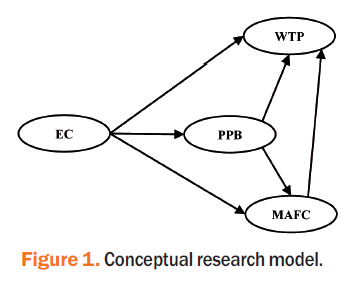
4. Research findings
The data for this study was collected through an online research panel (Nationwide Research Panel Ariadna) in April 2023. The online survey included a total of 554 Polish respondents; all interviews were complete (with no missing data). A non-random sampling method was used; the sample structure matched the demographics of adult Poles in terms of gender, age, education level, and place of residence. The dataset was created with SPSS, version 28 (IBM). A confirmatory factor analysis (CFA) was performed and a structural equation model (SEM) was developed using IBM SPSS AMOS Graphics, version 25. A multi-item measurement scale was developed to measure the attitudes of Poles regarding environmental concern (EC) (adopted from Polonsky et al., 2014), promoting pro-environmental behavior (PPB), the belief that Poland should move away from coal (MAFC) and willingness to pay (WTP) (based on Laroche et. al., 2001). Each factor was measured by three items using a five-point Likert scale (from 1 = strongly disagree to 5 = strongly agree). Since ordinal variables were used in the measurement process, before conducting further analyses, it was assumed that there were equal distances between the categories on the measurement scale. The selection of the research sample was carried out by the quota method (selection criteria: sex, age and place of residence). The structure of the research sample is presented in Table 1.
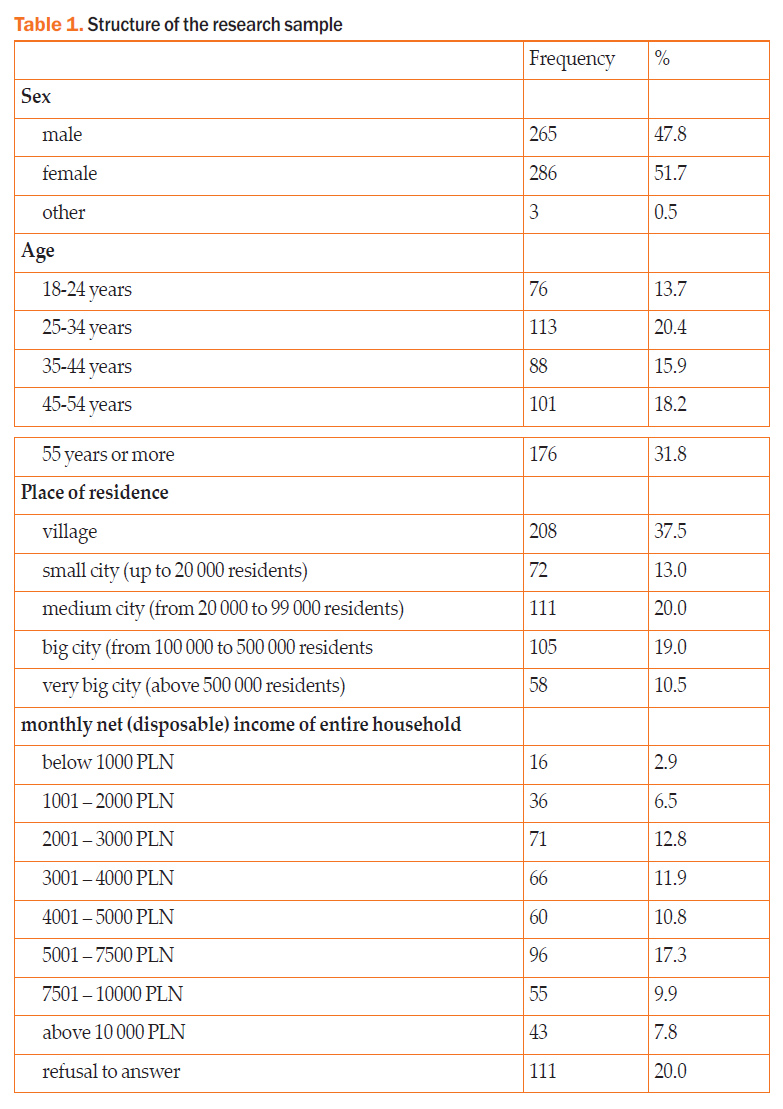
5. Results
Measurement Model
Table 2 shows the results of the confirmatory factor analysis (CFA), including factor loadings and descriptive statistics. One of the four sets of variables was found to be characterized by a high average – environmental concern (EC) (meanEC = 3.92). The remaining sets of variables were considered by the respondents as less important – the belief that Poland should move away from coal (MAFC) (meanMAFC = 3.26), promoting pro-environmental behavior (PPB) (meanPPB = 3.17) and, as the least important, willingness to pay (WTP) (meanWTP = 2.84).
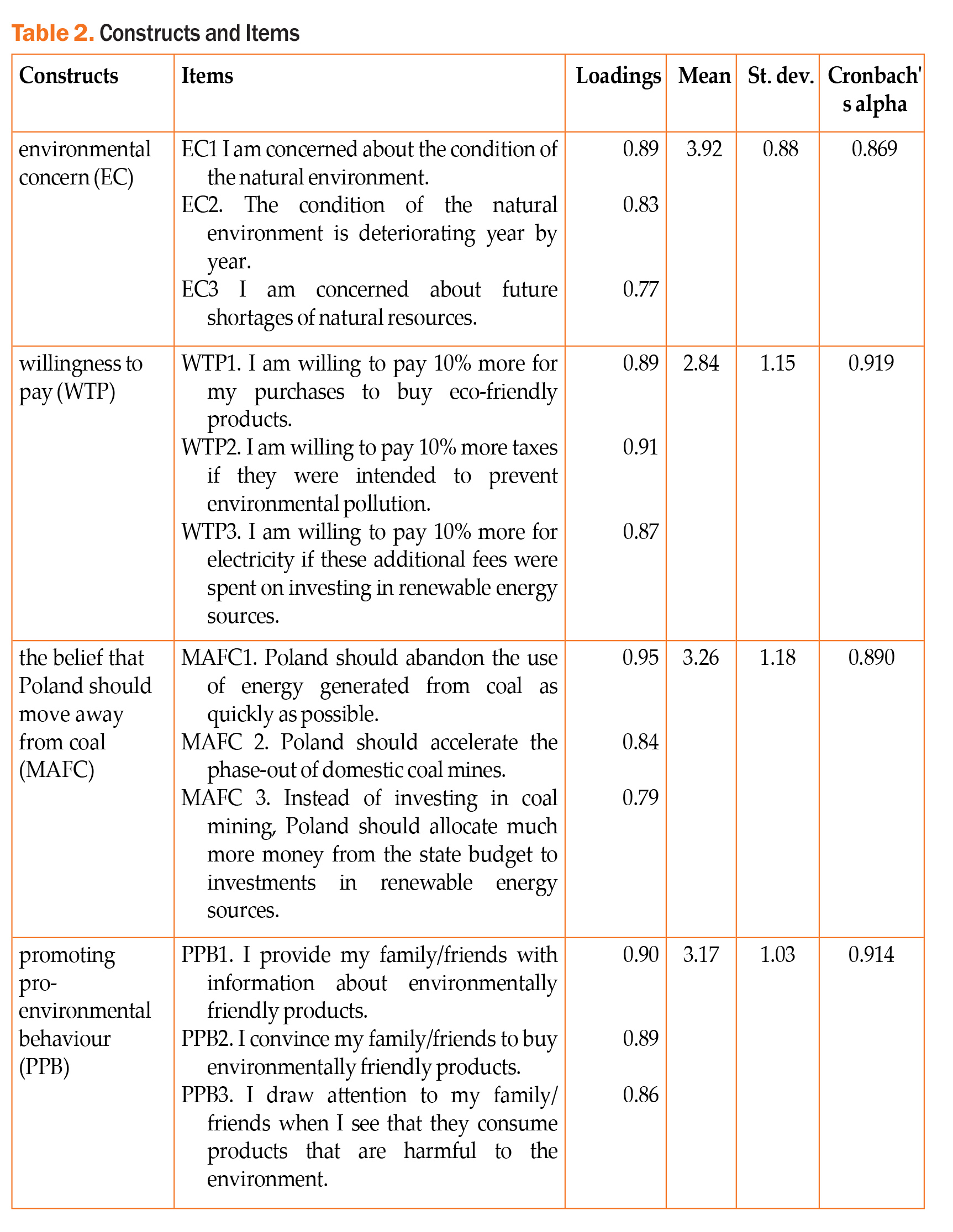
A structural equation model was used to test hypothetical relationships between observable and/or latent variables in experimental and non-experimental research (Konarski, 2009, p. 15). The structural equation model consists of two parts – the structural and the measurement parts. The structural part of the model describes the theoretical cause-and-effect or correlation between the studied phenomena, while the measurement part defines the variables which are not directly measurable (therefore they are represented in the constructed model by unobservable/latent variables). This means that before starting the estimation of the structural equation model, its measurement part should be determined and verified. One of the methods of verifying the measurement model is confirmatory factor analysis (Bedyńska, Książek, 2012, pp. 219–223). The reliability of measurement instrument was tested using Confirmatory Factor Analysis (CFA), where the results showed acceptable model fit indices.
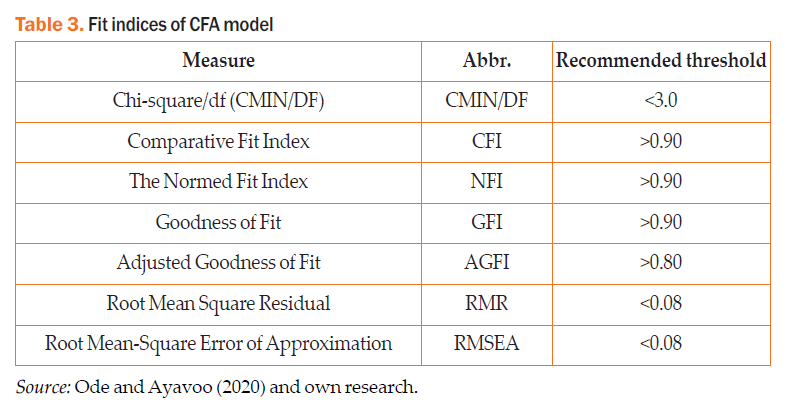
The overall measurement model and reliability and validity of the constructs were evaluated with a confirmatory factor analysis (CFA).
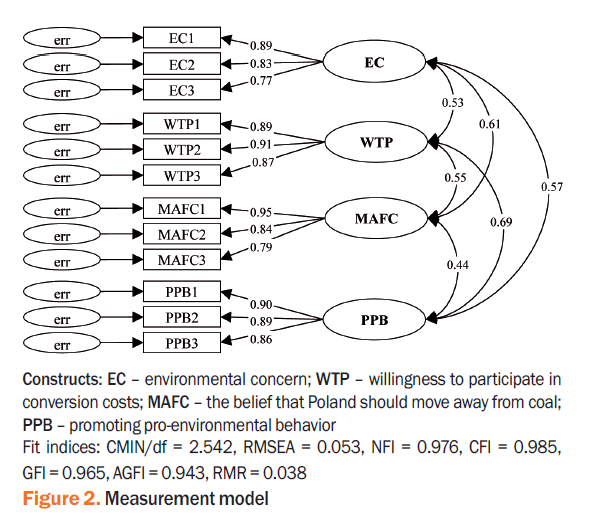
In the process of evaluating the measurement model, both discriminant and convergent validity were verified. Discriminant validity measures the extent to which the factors intended to measure a specific construct are actually unrelated (Wang & Wang, 2012). For this, Fornell and Larcker’s (1981) approach was used, which states that the average variance extracted (AVE) for each research construct should be higher than the square of the correlation between that construct and other constructs (Ode & Ayavoo, 2020). The diagonal elements in Table 4 (shown in bold with asterisks) are the squares of multiple correlations between the research variables. The AVE values ranged from 0.69 to 0.91, while the diagonal values ranged from 0.83 to 0.89, indicating that all constructs have the appropriate discriminant validity. Table 4 shows that the measurement model has a satisfactory discriminant validity.
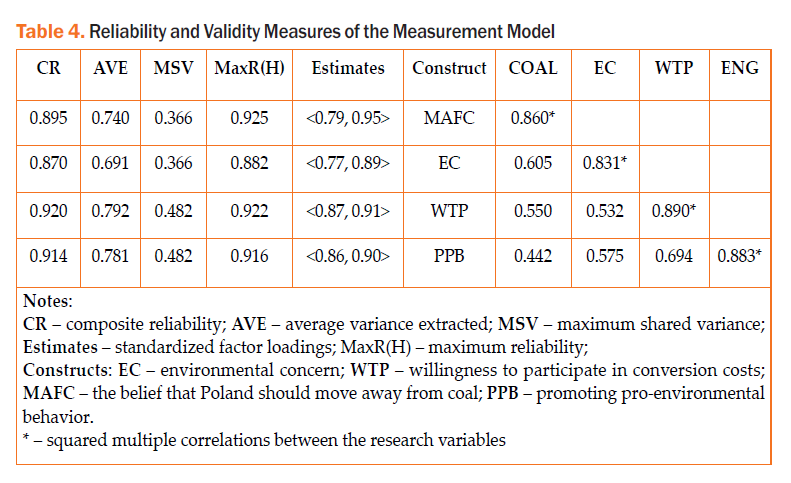
Convergent validity, in turn, measures the degree to which the factors measuring single constructs are consistent with each other. Convergent validity was assessed using composite reliability (CR) and average variance extracted (AVE) – the minimum values adopted in the analysis were such that AVE should be greater than 0.5 (Fornell & Larcker, 1981), factor loadings should be greater than 0.6 and CR should be greater than 0.6 (Hair et al., 2009; Ahmed et al., 2020; Popa & Dabija, 2019; Szczepańska-Woszczyna, 2021). On the basis of the obtained results, all three minimum values were reached, which suggests that the reliability and validity of the model and the constructs used are acceptable.
Structural Model
Based on the literature review, the results of confirmatory factor analysis (CFA) and the adopted research hypotheses, a research model was developed and is graphically illustrated in Figure 3.
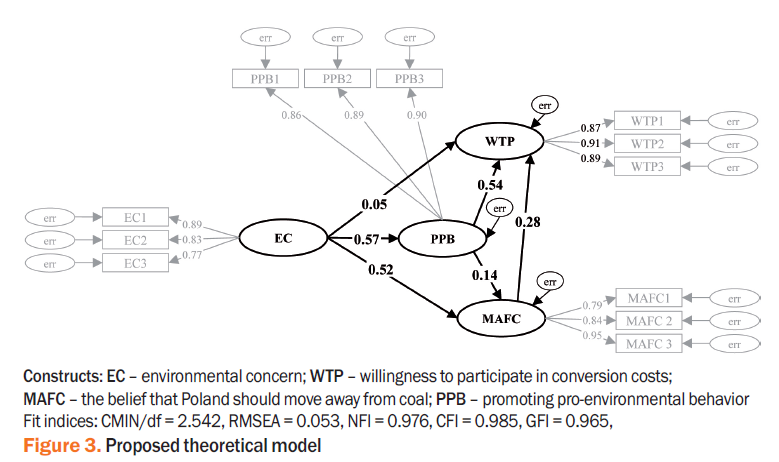
The fit indices indicate that the structural equation model is appropriate for verifying the research hypotheses.
Testing Hypothesis
The hypothesis test results are shown in Table 5 below. The results indicate that promoting pro-environmental behavior (PPB) was influenced by environmental concern (EC) (ꞵ = 0.575, p < 0.001). We found that the belief that Poland should move away from coal (MAFC) was influenced by environmental concern (EC) (ꞵ = 0.525, p < 0.001) and promoting pro-environmental behavior (PPB) (ꞵ = 0.140, p ≤ 0.005). Furthermore willingness to pay (WTP) was influenced by promoting pro-environmental behavior (PPB) (ꞵ = 0.541, p < 0.001) and the belief that Poland should move away from coal (MAFC) (ꞵ = 0.279, p < 0.001). The results obtained confirm the validity of hypotheses H1, H2, H4, H5 and H6, whereas hypothesis H3, which posited that environmental concern (EC) affects willingness to pay (WTP), was not supported.
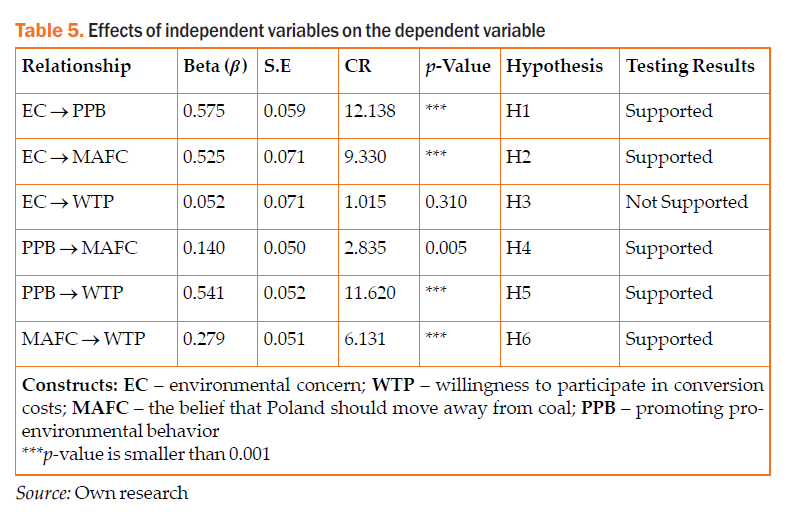
6.Discussion
The results of our study indicate that while environmental concern (EC) positively influences promoting pro-environmental behavior (PPB) and the belief that Poland should move away from coal (MAFC), it does not significantly influence willingness to share in the costs of conversion. Therefore, a certain dissonance was observed between concern for the environment and the willingness to make financial commitments to improve it, which may result from the rising costs of living in Poland, including energy costs. Our findings suggest that EC influencers PPB. Taking on the role of an opinion leader and making efforts to ensure that people around oneself are also more pro-ecological, in turn, influences both attitudes towards changing energy sources to more environmentally friendly ones and the willingness to bear the associated costs. We found that the belief that Poland should move away from coal (MAFC) positively influences willingness to pay (WTP), indicating that opinions on the need to change to more pro-ecological ones are backed by declarations about the willingness to pay for them. Our research shows that environmental concern alone is not enough for some Poles to be willing to spend additional money on (more expensive) pro-ecological products or support changing the energy mix to a more ecological one. The lack of a significant impact of CE on WTP shows that further research in this area is needed, as in the literature this relationship remains ambiguous. Perhaps it depends on the level of development and wealth of the citizens of a given country, hence comparative studies in other countries would be advisable. Our study partially fills this research gap on the influence of EC on WTP among Polish consumers.
Limitations and future research directions
The study has several limitations. Due to the sample size and the selected method of sampling, the results cannot be treated as representative for the general population of Polish consumers. Our research focused on four factors – environmental concern (EC), promoting pro-environmental behavior (PPB), the belief that Poland should move away from coal (MAFC), and willingness to pay (WTP) – so future research could widen the spectrum of factors in future research. While our results are relevant to Polish consumers, cultural differences may result in varying attitudes toward environmentally friendly behavior in other countries. Conducting transnational research in this area would be valuable.
References
Ahmed, R. R., Romeika, G., Kauliene, R., Streimikis, J., & Dapkus , R. (2020). ES-QUAL model and customer satisfaction in online banking: evidence from multivariate analysis techniques. Oeconomia Copernicana, 11(1), 59–93. https://doi.org/10.24136/oc.2020.003
Akehurst, G., Afonso, C., & Martins Gonçalves, H. (2012). Re-examining green purchase behaviour and the green consumer profile: New evidences. Management Decision, 50(5), 972–988. https://doi.org/10.1108/00251741211227726
Anderson, E. W. (1996). Customer satisfaction and price tolerance. Marketing Letters, 7, 265–274.
Arpad, T. (2018). Willing to pay to save the planet? Evaluating support for increased spending on sustainable development and environmentally friendly policies in five countries. PLoS ONE, 13(11), e0207862. https://doi.org/10.1371/journal. pone.0207862
Bedyńska, S. & Książek, M. (2012). Statystyczny drogowskaz 3. Praktyczny przewodnik wykorzystania modeli regresji oraz równań strukturalnych. Szkoła Wyższa Psychologii Społecznej: Warsaw, POL, pp. 219–223, ISBN 9788363354053
Carrington, M., Neville, B., & Whitwell, G. (2010). Why ethical consumers don’t walk their talk: Towards a framework for understanding the gap between the ethical purchase intentions and actual buying behaviour of ethical minded consumers. Journal of Business Ethics, 97(1), 139–158. https://doi.org/10.1007/s10551-010-0501-6
Carman, K. M. L., & Cheng, E. W. L. (2016). Green purchase behavior of undergraduate students in Hong Kong. The Social Science Journal, 53(1), 67–76. https://doi.org/10.1016/j.soscij.2015.11.003
Carrico, A. R. (2021). Climate change, behavior, and the possibility of spillover effects: Recent advances and future directions. Current Opinion in Behavioral Sciences, 42, 76–82. https://doi.org/10.1016/j.cobeha.2021.03.025
Chen, T. B., & Chai, L. T. (2010). Attitude towards the environment and green products: Consumers’ perspective. Management Science and Engineering, 4(2), 27–39. https://doi.org/10.3968/j.mse.1913035×20100402.002
Chin, J., Jiang, B., Mufidah, I., Persada, S., & Noer, B. (2018). The investigation of consumers’ behavior intention in using green skincare products: A pro-environmental behavior model approach. Sustainability, 10(11), 3922. https://doi.org/10.3390/su10113922
De Canio, F. (2023). Consumer willingness to pay more for pro-environmental packages: The moderating role of familiarity. Journal of Environmental Management, 339. https://doi.org/10.1016/j.jenvman.2023.117828
De Toni, D., Eberle, L., Larentis, F., & Milan, G. S. (2018). Antecedents of perceived value and repurchase intention of organic food. Journal of Food Products Marketing, 24, 456–475. https://doi.org/10.1080/10454446.2017.1314231
Dienes, C. (2015). Actions and intentions to pay for climate change mitigation: Environmental concern and the role of economic factors. Ecological Economics, 109, 122–129. https://doi.org/10.1016/j.ecolecon.2014.11.012
Durif, F., Boivin, C., & Julien, C. (2017). In search of a green product definition. Innovative Marketing, 6(1), 25–33.
Dursun, I., Kabadayi, E. T., Koksal, C. G., & Tuger, A. T. (2016). Pro-environmental consumption: Is it really all about the environment? Journal of Management Marketing and Logistics, 3(2), 114–134. https://doi.org/10.17261/Pressacademia. 2016219940
Eckhardt, G. M., Belk, R., & Devinney, T. M. (2010). Why don’t consumers consume ethically? Journal of Consumer Behaviour, 9(6), 426–436. https://doi.org/10.1002/ cb.332
Eze, E. (2020). Sociographic analysis of climate change awareness and proenvironmental behaviour of secondary school teachers and students in Nsukka local government area of Enugu State, Nigeria. International Research in Geographical and Environmental Education, 29, 89–105. https://doi.org/10.1080/ 10382046.2019.1657683
Fornell, C. & Larcker, D.F. (1981). Structural equation models with unobservable variables and measurement error: Algebra and statistics. Journal of Marketing Research, 18/3, pp. 382–388.
Geng, J., Yang, N., Zhang, W., & Yang, L. (2023). Public willingness to pay for green lifestyle in China: A contingent valuation method based on integrated model. International Journal of Environmental Research and Public Health, 20, 2185. https://doi.org/10.3390/ijerph20032185
GlobalData. (2022). Poland power market size and trends by installed capacity, generation, transmission, distribution, and technology, regulations, key players and forecast, 2022–2035.
Hair, J.F. Jr., Black, W.C., Babin, B.J. & Anderson, R.E. (2009). Multivariate Data Analysis, 7-th ed.; Pearson International Edition, Upper Saddle River: New Jersey, USA, pp. 627–686, ISBN 9780138132637
Hartmann, P., & Apaolaza-Ibañez, V. (2012). Consumer attitude and purchase intention toward green energy brands: The roles of psychological benefits and environmental concern. Journal of Business Research, 65, 1254–1263. https://doi.org/10.1016/j.jbusres.2011.11.001
Hojnik, J., Ruzzier, M., Fabri, S., & Klopčič, A. L. (2021). What you give is what you get: Willingness to pay for green energy. Renewable Energy, 174, 733–746. https://doi.org/10.1016/j.renene.2021.04.037
Hsu, C.-L., Chang, C.-Y., & Yansritakul, C. (2017). Exploring purchase intention of green skincare products using the theory of planned behavior: Testing the moderating effects of country of origin and price sensitivity. Journal of Retailing and Consumer Services, 34, 145–152. https://doi.org/10.1016/j.jretconser. 2016.10.006
Irfan, M., Zhao, Z. Y., Li, H., et al. (2020). The influence of consumers’ intention factors on willingness to pay for renewable energy: A structural equation modeling approach. Environmental Science and Pollution Research, 27, 21747–21761. https://doi.org/10.1007/s11356-020-08592-9
Jaiswal, D., & Kant, R. (2018). Green purchasing behaviour: A conceptual framework and empirical investigation of Indian consumers. Journal of Retailing and Consumer Services, 41, 60–69. https://doi.org/10.1016/j.jretconser.2017.11.008
Jin Gam, H. (2011). Are fashion-conscious consumers more likely to adopt eco-friendly clothing? Journal of Fashion Marketing and Management, 15(2), 178–193. https://doi.org/10.1108/13612021111132627
Kim, S., & Kim, S. (2023). Willingness to pay for what? Testing the impact of four factors on willingness to pay for facilitating and sanctioning energy policy instruments. Energy Reports, 10, 285–299. https://doi.org/10.1016/j.egyr.2023. 06.021
Konarski, R. (2009). Modele równań strukturalnych. Teoria i praktyka. Wydawnictwo Naukowe PWN p. 15, ISBN 9788301160944.
Laroche, M., Bergeron, J., & Barbaro-Forleo, G. (2001). Targeting consumers who are willing to pay more for environmentally friendly products. Journal of Consumer Marketing, 18(6), 503–520. https://doi.org/10.1108/EUM0000000006155
Lee, K. H., Bonn, M. A., & Cho, M. (2015). Consumer motives for purchasing organic coffee. International Journal of Contemporary Hospitality Management, 27, 1157–1180. https://doi.org/10.1108/IJCHM-02-2014-0060
Lee, J., & Haley, E. (2022). Green consumer segmentation: Consumer motivations for purchasing pro-environmental products. International Journal of Advertising, 41(8), 1477–1501. https://doi.org/10.1080/02650487.2022.2038431
Lee, S. (2011). Consumers’ value, environmental consciousness, and willingness to pay more toward green-apparel products. Journal of Global Fashion Marketing, 2(3), 161–169. https://doi.org/10.1080/20932685.2011.10593094
Li, L., Long, X., & Laubayeva, A. et al. (2020). Behavioral intention of environmentally friendly agricultural food: The role of policy, perceived value, subjective norm. Environmental Science and Pollution Research, 27, 18949–18961. https://doi.org/10.1007/s11356-020-08261-x
Li, Y., Mu, X., Schiller, A., & Zheng, B. (2016). Willingness to pay for climate change mitigation: Evidence from China. The Energy Journal, 37(1_suppl), 179–194. https://doi.org/10.5547/01956574.37.SI1.yli
Lin, B., & Qiao, Q. (2023). Exploring the participation willingness and potential carbon emission reduction of Chinese residential green electricity market. Energy Policy, 174. https://doi.org/10.1016/j.enpol.2023.113452
Lin, C. Y., & Syrgabayeva, D. (2016). Mechanism of environmental concern on intention to pay more for renewable energy: Application to a developing country. Asia Pacific Management Review, 21(3), 125–134. https://doi.org/10.1016/ j.apmrv.2016.01.001
Liobikienë, G., & Dagiliûtë, R. (2021). Do positive aspects of renewable energy contribute to the willingness to pay more for green energy? Energy, 231. https://doi.org/10.1016/j.energy.2021.120817
Liobikienë, G., Mandravickaitë, J., & Bernatonienë, J. (2016). Theory of planned behavior approach to understand the green purchasing behavior in the EU: A cross-cultural study. Ecological Economics, 125, 38–46. https://doi.org/10.1016/ j.ecolecon.2016.02.008
Liu, W., Wang, X., & Chen, Z. (2017). The consistency of rural residents’ ecological consumption awareness and behavior based on the investigation of eco-civilization demonstration areas in Jiangxi Province. Issues in Agricultural Economy, 38, 37–49. https://doi.org/10.13246/j.cnki.iae.2017.09.006
Mansoor, M., Awan, T. M., & Paracha, O. S. (2021). Predicting pro-environmental behaviors of green electronic appliances’ users. International Journal of Business and Economic Affairs, 6(4), 175–186. https://doi.org/10.24088/IJBEA-2021-64002
Mei, N. S., Wai, C. W., & Ahamad, R. (2016). Environmental awareness and behaviour index for Malaysia. Procedia Social and Behavioral Sciences, 222, 668–675. https://doi.org/10.1016/j.sbspro.2016.05.223
Mohammad, H. M., Morteza, M. M., Azim, Z., & Golnar, S. B. (2020). Knowledge foundation in green purchase behaviour: Multidimensional scaling method. Cogent Business & Management, 7(1). https://doi.org/10.1080/23311975.2020. 1773676
Monroe, K. B. (1973). Buyers’ subjective perceptions of price. Journal of Marketing Research, 10, 70–80.
Moon, H., & Lee, H.-H. (2018). Environmentally friendly apparel products: The effects of value perceptions. Social Behavior and Personality: An International Journal, 46(8), 1373–1384. https://doi.org/10.2224/sbp.6392
Mostafa, M. M. (2006). Antecedents of Egyptian consumers’ green purchase intentions: A hierarchical multivariate regression model. Journal of International Consumer Marketing, 19(2), 97–126. https://doi.org/10.1300/J046v19n02_06
Newton, J. D., Tsarenko, Y., Ferraro, C., & Sands, S. (2015). Environmental concern and environmental purchase intentions: The mediating role of learning strategy. Journal of Business Research, 68, 1974–1981. https://doi.org/10.1016/ j.jbusres.2015.01.007
Ode, E. & Ayavoo, R. (2020). The mediating role of knowledge application in the relationship between knowledge management practices and firm innovation. Journal of Innovation & Knowledge, 5, pp. 209–217
Paul, J., Modi, A., & Patel, J. (2016). Predicting green product consumption using theory of planned behavior and reasoned action. Journal of Retailing and Consumer Services, 29, 123–134. https://doi.org/10.1016/j.jretconser.2015.11.006
Polonsky, M. J., Vocino, A., Grimmer, M., & Miles, M. P. (2014). Temporal and environmental orientation and PECB. International Journal of Consumer Studies, 38, 612–619. https://doi.org/10.1111/ijcs.12131
Popa, I.D. & Dabija, D.C. (2019). Developing the Romanian Organic Market: A Producer’s Perspective. Sustainability, 11, 467.
Quoquab, F., Mohammad, J., & Sukari, N. N. (2019). A multiple-item scale for measuring “sustainable consumption behaviour” construct: Development and psychometric evaluation. Asia Pacific Journal of Marketing and Logistics, 31(4), 791–816. https://doi.org/10.1108/APJML-02-2018-0047
Ramayah, T., Lee, J. W., & Mohamad, O. (2010). Green product purchase intention: Some insights from a developing country. Resources Conservation and Recycling, 54, 1419–1427. https://doi.org/10.1016/j.resconrec.2010.06.007
Ritter, A. M., Borchardt, M., Vaccaro, G. L. R., Pereira, G. M., & Almeida, F. (2015). Motivations for promoting the consumption of green products in an emerging country: Exploring attitudes of Brazilian consumers. Journal of Cleaner Production, 106, 507–520. https://doi.org/10.1016/j.jclepro.2014.11.066
Saepudin, D., Shojaei, A. S., Barbosa, B., & Pedrosa, I. (2023). Intention to purchase eco-friendly handcrafted fashion products for gifting and personal use: A comparison of national and foreign consumers. Behavioral Sciences, 13(2), 171. https://doi.org/10.3390/bs13020171
Scott, L., & Vigar-Ellis, D. (2014). Consumer understanding, perceptions and behaviours with regard to environmentally friendly packaging in a developing nation. International Journal of Consumer Studies, 38, 642–649. https://doi.org/10.1111/ijcs.12136
Seema, B., Naman, S., Manish, D., & Asmita, C., Sushant, K. (2023). Product specific values and personal values together better explains green purchase. Journal of Retailing and Consumer Services, 74. https://doi.org/10.1016/j.jretconser. 2023.103434
Sheng, G., Yue, B., & Xie, F. (2019). The driving mechanism of Chinese residents’ green consumption behavior from the perspective of environmental co-governance. Statistical Information Forum, 34, 109–116. https://doi.org/10.3969/ j.issn.1007-3116.2019.01.014
Singh, N., & Gupta, K. (2013). Environmental attitude and ecological behaviour of Indian consumers. Social Responsibility Journal, 9(1), 4–18. https://doi.org/10.1108/ 17471111311307787
Sudbury-Riley, L., & Kohlbacher, F. (2016). Ethically minded consumer behavior: Scale review, development, and validation. Journal of Business Research, 69(8), 2697–2710. https://doi.org/10.1016/j.jbusres.2015.11.005
Suki, N. M., & Suki, N. M. (2015). Consumption values and consumer environmental concern regarding green products. International Journal of Sustainable Development & World Ecology, 22(3), 269–278. https://doi.org/10.1080/13504509. 2015.1013074
Szczepańska-Woszczyna, K. (2021). Management Theory, Innovation, and Organisation. A Model of Managerial Competencies; Routledge: Milton Park, UK, ISBN 9780367485528
Vanegas-Rico, M.-C., Corral-Verdugo, V., Bustos-Aguayo, J.-M., & Ortega-Andeane, P. (2022). Expectations of others’ environmental behaviour and its effect on personal pro-environmental behaviour. PsyEcology, 13, 29–49. https://doi.org/10.1080/21711976.2021.1992872
Vasiljevic-Shikaleska, A., Trpovski, G., & Gjozinska, B. (2018). Environmental awareness and pro-environmental consumer behavior. Journal of Sustainable Development, 8, 4–17.
Vivian, S., Haslam, K., Soldner, M., & Sangster, M. (2011). Assessment of European energy and carbon profiles of manual and automatic dishwashing. International Journal of Consumer Studies, 35, 187–198. https://doi.org/10.1111/j.1470-6431.2010.00986.x
Wang, J. (2013). The effect of resource saving consciousness on resource saving behavior – an interactive effect and moderating effect model under the background of Chinese culture. Management World, 8, 77–90. https://doi.org/10.19744/j.cnki.11-1235/f.2013.08.008
Wang, Q., Song, W., & Peng, X. (2022). The behavior-driven mechanism of consumer participation in “carbon neutrality”: Based on the promotion of replacing coal with biomass briquette fuel. International Journal of Environmental Research and Public Health, 19, 15133. https://doi.org/10.3390/ijerph192215133
Wang, Z. & Wang, N. (2012). Knowledge sharing, innovation and firm performance. Expert Systems With Applications. 39(10), pp. 8899–8908
Woo, E., & Kim, Y. G. (2019). Consumer attitudes and buying behavior for green food products: From the aspect of green perceived value (GPV). British Food Journal, 121(2), 320–332. https://doi.org/10.1108/BFJ-01-2018-0027
Yadav, S., Patel, S., Killedar, D. J., Kumar, S., & Kumar, R. (2022). Eco-innovations and sustainability in solid waste management: An Indian upfront in technological, organizational, start-ups and financial framework. Journal of Environmental Management, 302. https://doi.org/10.1016/j.jenvman.2021.113953
Yang, D., Lu, Y., Zhu, W., & Su, C. (2015). Going green: How different advertising appeals impact green consumption behavior. Journal of Business Research, 68(12), 2663–2675. https://doi.org/10.1016/j.jbusres.2015.04.004
Zhang, J., Cherian, J., Sandhu, Y. A., Abbas, J., Cismas, L. M., Negrut, C. V., & Negrut, L. (2022). Presumption of green electronic appliances purchase intention: The mediating role of personal moral norms. Sustainability, 14, 4572. https://doi.org/10.3390/su14084572
Szymon Michalak, Poznań University of Economics and Business, Poland — PhD in economic sciences, Assistant Professor in the Product Marketing Department of Poznań University of Economics and Business. His main research interests include consumer attitudes towards product innovation and consumer involvement in value co-creation. A team member on projects with EU funding, as well as projects for enterprises, local government units, and the Polish Ministry of Agriculture and Rural Development. He teaches such subjects as Innovation Management, Product Management, Marketing Research, and Enterprise Management.
Paweł Bartkowiak, Poznań University of Economics and Business, Poland — PhD in economic sciences, Assistant Professor at the Department of Strategic Management, Poznań University of Economics and Business. His main research interests include processes of value cocreation, determinants of consumers’ market behavior, project management and strategic decision-making at enterprises. He teaches courses in strategic management, project management and market and marketing research.
Magda Stachowiak-Krzyżan, Poznań University of Economics and Business, Poland — PhD in economic sciences, Assistant Professor in the Product Marketing Department, Poznań University of Economics and Business. Her research and teaching interests focus on consumer behavior, social marketing, marketing communication and the clothing market in social media.

